When the weather outside does not please with warmth, and the beginning of the heating season is still far away, the question of economical and high-quality heating of the room arises. If you live in a private house, nothing is easier. One has only to light up the stove. And what should the residents of the multi-apartment sector do? A variety of heating devices come to the rescue. This is where a natural question arises: which is better than a convector or an oil heater? If you have never come across either one or the other, there is something to think about. This is what our article today will be about.
So, an oil heater or a convector? What's better? Feedback from experts and consumers will help you make the right choice. To find out exactly which heater is better, let's first find out how each of them works.
The principle of the oil cooler
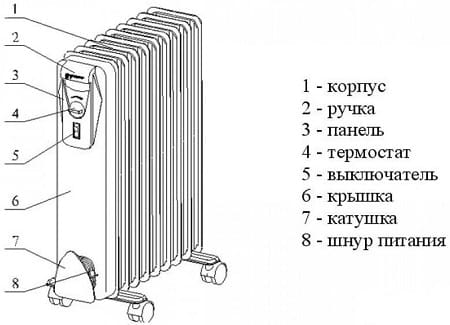
Everything is arranged very simply here. The oil cooler is a hermetically sealed reservoir filled with mineral oil. An electric heater is also located inside the structure. As a result of the operation of the heating element, the oil temperature rises, and then the walls of the reservoir are heated. The room is heated.
To prevent the oil from boiling, the system is equipped with a special sensor that monitors the temperature. In addition, some models have horizontal control. This means that if the radiator accidentally overturns and the heating element is outside the oil environment, the automation will instantly turn off the device.
Using oil coolers is very simple. No knowledge is required here. You just need to plug the plug into the outlet, press the power button and move the device closer. Some manufacturers equip their models with a timer that allows you to automatically turn on the device at a specific time. This is very convenient if you want, for example, to return from work to an already well-heated room. At the same time, the radiator remains off throughout the day and does not waste electricity.
![]() See also - Comparison of an electric convector and a fan heater
See also - Comparison of an electric convector and a fan heater
Advantages and disadvantages
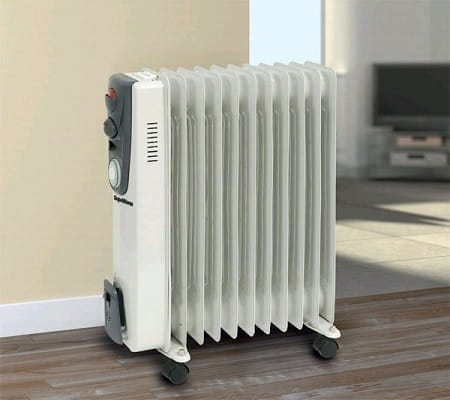
Based on consumer feedback, we tried to highlight the main disadvantages and advantages of such heating devices. The advantages of an oil heater include the following:
- Low cost.
- High-quality heating of the ambient air due to the increased heat transfer area.
- "Soft" heating. If we compare it with heaters with an open spiral, it can be noted that the oil cooler does not dry out the air. In addition, dust particles in the immediate vicinity do not burn during its operation.That is why in the process there are no extraneous odors.
- Mobility. Since oil heaters in 98% of cases are floor mounted and have castors, they can easily be placed in any place of your choice.
- Durability and reliable performance.
However, in addition to the undeniable advantages of radiators, there are also disadvantages. Find them also helped customer reviews. So cons:
- Pretty high t˚C case. During operation at maximum power, the walls of the oil cooler can heat up to temperatures above 90 C. This fact calls for thinking about the issue of safety.
- Impressive weight. Some models of oil heaters can “pull” 25 kg, while the smallest ones rarely weigh less than 10 kg. This may create additional inconvenience when moving.
- The probability of leakage of coolant (oil) due to mechanical damage to the housing. Moreover, if this happens, the heater will just have to be thrown away. The cost of repair is often not comparable with the cost of a new device.
TOP 3 best oil heaters
- Timberk TOR 21.1206 BC / BCL
- Scarlett SC 21.1005 S / SB
- Polaris CR 0512B
![]() See also - Rating of the best oil heaters according to user reviews
See also - Rating of the best oil heaters according to user reviews
How the convector is arranged and works
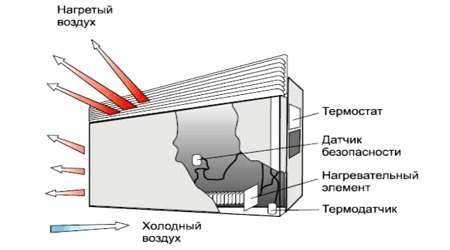
Externally, distinguishing a convector from an oil cooler is very simple. If the latter looks like an “accordion on legs”, then the first has a flat smooth body with slots on the top and bottom. The main difference between these devices is the method of heating the room. The radiator first heats the oil, and the convector directly warms the air masses.
The principle of operation of the convector is based on the physical properties of cold and hot air. The second, as you know, is easier. In the hollow body of the convector there is only a heating element (spiral) and a temperature sensor. Cold air enters the convector through the slots located at the bottom of the appliance. Then, the air masses heated by the heating element naturally exit through the holes located in the upper part of the housing. And their place is again occupied by cold air, the process repeats.
Each convection heating device is equipped with a temperature sensor that turns the device on and off, depending on whether the air in the room has acquired the set temperature. This is very convenient since there is no need to monitor the device. Automation independently maintains a comfortable room temperature.
Almost all models of convectors have two ways of placement. They can be hung on the wall or mounted on special legs and placed in a convenient place on the floor.
![]() See also - Choosing the best electric convector for home
See also - Choosing the best electric convector for home
Pros and cons
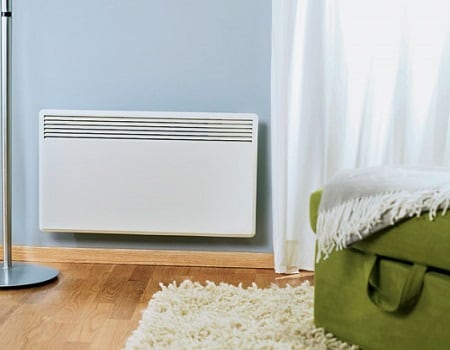
Identify all the advantages and disadvantages will also help us consumer reviews.
Advantages:
- When using a convector, you can set the exact (literally to a degree) temperature in the room and the automation will support it.
- The body of the device heats up no higher than 60 C, which is much safer than in the case of oil devices.
- With a little effort, you can connect several convectors into a common heating system. The oil type heater works exclusively individually.
Nevertheless, the convector has its drawbacks:
- Customer reviews suggest that using such equipment in the room may cause a small draft.
- Premises with high (above 3 m) ceilings may not warm up very well. Warm air will “hang” under the ceiling and the device may not work efficiently enough.
- Natural convection can lead to increased movement of microorganisms and dust particles. This can be unpleasant for people prone to allergic reactions or diseases of the ENT organs.
TOP-3 best convection heater
- Noirot Spot E-3 Plus 1500
- Hyundai H-HV15-15-UI618
- Ballu BEC / ETMR-1500
![]() See also - How to choose an economical electric boiler for heating a house
See also - How to choose an economical electric boiler for heating a house
Comparative characteristics
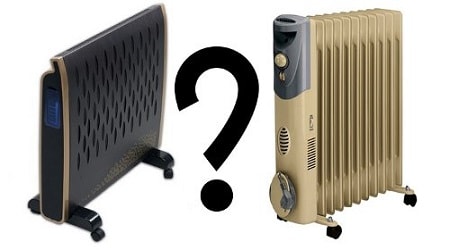
To finally answer the question of which heater is better: oil or convection heater, let's make a small comparison table:
| Options for comparison | Oil | Convector
|
| Economical use | Not too economical. | It consumes 20–25% less electricity than a radiator. |
| Heating time | It heats up for a long time, as it heats the oil first and only then the air. However, models equipped with a fan heat up even faster than a convector. | Immediately acts directly on air.
|
| Convenience | In almost 100% of cases, it is only outdoor. In addition, many models are quite heavy. | The variability of the location is much more comfortable, for example, when cleaning. Due to convection, the room warms up much more evenly.
|
| Safety | The body of the device can be heated to a temperature much higher than the safe one. However, there are models equipped with a protective cover. In this case, the probability of getting burned is almost excluded.
If the technology of use and safety rules are violated, an explosion is possible. |
The surface of the convector never heats above 55-60 degrees. You can freely leave your child next to this device.
The absence of a coolant excludes the possibility of an explosion. The device can be safely left unattended for any length of time. |
| Lifetime
|
7-10 years old | 10-15 years
|
| Effective heating area | Most suitable for heating a not very large room. When used in a room larger than 25 m2, it is recommended to use several devices at the same time. | Depending on the capacity, it can be effectively used in rooms up to 100 m2.
|
| Sustainability | Oxygen is not burned. There is no strong movement of air masses. | Oxygen is not burned. Slight movement of microorganisms and dust particles may occur.
|
| The cost | Most often they are inexpensive. | They are much more expensive than their oil "counterparts". |
Thus, the answer to the question of which convector or oil heater is better folds by itself. Despite the higher price, convectors still outperform oil appliances in almost all respects. Although, the choice, of course, is yours.
![]() See also - Which heater does not burn oxygen or dry air
See also - Which heater does not burn oxygen or dry air


